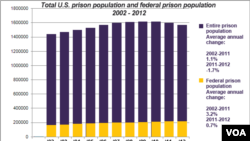WASHINGTON —
U.S. Attorney General Eric Holder has announced a major shift in how the federal government plans to prosecute nonviolent criminals involved in drug crimes, with the aim of easing overcrowding in the nation’s prisons.
Holder outlined several policy changes in a speech to the American Bar Association meeting in San Francisco.
The attorney general said too many Americans go to prison for far too long and for no truly good law enforcement reason. His main focus was low-level drug crimes that can often bring minimum mandatory sentences of five or 10 years in prison.
Holder says the federal government will now follow the lead of several states that emphasize drug treatment and community service programs as alternatives for non-violent drug offenders who are not associated with criminal gangs or drug cartels.
"Widespread incarceration at the federal, state and local levels is both ineffective and unsustainable," he said. "It imposes a significant economic burden totalling $80 billion in 2010 alone and it comes with human and moral costs that are impossible to calculate."
Mandatory prison terms were a key part of the war on drugs first launched in the 1980s. But Holder says the federal prison system is now operating at nearly 40 percent above capacity and that the federal prison population has grown by almost 800 percent since 1980. More than half of all inmates are incarcerated for drug-related crimes.
Holder has also directed federal prosecutors around the country to develop recommendations on how to address the racial disparities in criminal sentencing. He noted a recent report that found African-American offenders receive prison sentences 20 percent longer that those imposed on whites for similar crimes.
Holder also said he will expand the federal policy for considering the compassionate release of inmates who are elderly or ill, who did not commit violent crimes and who have served a significant portion of their jail sentence.
“This is our chance to bring America’s criminal justice system in line with our most sacred values. This is our promise to forge a more just society," he said.
Prison reform advocates welcomed Holder’s policy changes, including Molly Gill with the group Families Against Mandatory Minimums.
“I think people, when they commit a crime and go before a judge they expect to be treated like an individual. They expect to be heard," she said. "And when there is a mandatory minimum [sentence], no matter what you say, you are going to get that sentence and a lot of people feel that is really fundamentally unfair."
But supporters of mandatory prison sentences and the war on drugs were critical of Holder’s changes.
“The bad news is that I am afraid this could be interpreted as a statement that the federal government is losing its nerve in the war on drugs," said William Otis, a former federal prosecutor and an adjunct law professor at Georgetown University Law Center in Washington. "We’ve been more successful in that war than many people perhaps including the attorney general have given us credit for."
Holder says the steps he hopes to enact should help reduce the federal prison population in the United States, which now stands at more than 219,000 inmates. Holder noted that although the U.S. has just five percent of the world’s population, it accounts for almost a quarter of the world’s prison inmate population.
Holder outlined several policy changes in a speech to the American Bar Association meeting in San Francisco.
The attorney general said too many Americans go to prison for far too long and for no truly good law enforcement reason. His main focus was low-level drug crimes that can often bring minimum mandatory sentences of five or 10 years in prison.
Holder says the federal government will now follow the lead of several states that emphasize drug treatment and community service programs as alternatives for non-violent drug offenders who are not associated with criminal gangs or drug cartels.
"Widespread incarceration at the federal, state and local levels is both ineffective and unsustainable," he said. "It imposes a significant economic burden totalling $80 billion in 2010 alone and it comes with human and moral costs that are impossible to calculate."
Mandatory prison terms were a key part of the war on drugs first launched in the 1980s. But Holder says the federal prison system is now operating at nearly 40 percent above capacity and that the federal prison population has grown by almost 800 percent since 1980. More than half of all inmates are incarcerated for drug-related crimes.
Holder has also directed federal prosecutors around the country to develop recommendations on how to address the racial disparities in criminal sentencing. He noted a recent report that found African-American offenders receive prison sentences 20 percent longer that those imposed on whites for similar crimes.
Holder also said he will expand the federal policy for considering the compassionate release of inmates who are elderly or ill, who did not commit violent crimes and who have served a significant portion of their jail sentence.
“This is our chance to bring America’s criminal justice system in line with our most sacred values. This is our promise to forge a more just society," he said.
Prison reform advocates welcomed Holder’s policy changes, including Molly Gill with the group Families Against Mandatory Minimums.
“I think people, when they commit a crime and go before a judge they expect to be treated like an individual. They expect to be heard," she said. "And when there is a mandatory minimum [sentence], no matter what you say, you are going to get that sentence and a lot of people feel that is really fundamentally unfair."
But supporters of mandatory prison sentences and the war on drugs were critical of Holder’s changes.
“The bad news is that I am afraid this could be interpreted as a statement that the federal government is losing its nerve in the war on drugs," said William Otis, a former federal prosecutor and an adjunct law professor at Georgetown University Law Center in Washington. "We’ve been more successful in that war than many people perhaps including the attorney general have given us credit for."
Holder says the steps he hopes to enact should help reduce the federal prison population in the United States, which now stands at more than 219,000 inmates. Holder noted that although the U.S. has just five percent of the world’s population, it accounts for almost a quarter of the world’s prison inmate population.





